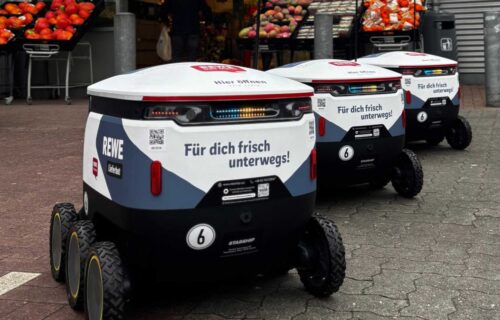German retailer REWE has launched the next phase of its autonomous delivery program in Hamburg, introducing an upgraded fleet of self-driving delivery robots under the banner REWE Lieferbot 2.0. The initiative follows a six-month pilot in Eimsbüttel last year, which tested both the technical feasibility and public response to the service.
The new phase is being deployed in Barmbek, where residents living near the REWE store on Holsteinischer Kamp can order groceries online through a dedicated app and receive deliveries to their doorstep. The compact, wheeled robots will operate Monday to Saturday between 8 a.m. and 9 p.m., serving an area of up to two kilometers around the store.
Each robot weighs around 35 kilograms, travels at walking speed, and can carry about 32 liters of groceries. They navigate sidewalks using a combination of 360-degree cameras, sensors, and artificial intelligence, stopping automatically when detecting pedestrians, cyclists, or obstacles. A single charge powers them for up to 18 hours, and according to REWE, the energy consumption for an average delivery is roughly equivalent to that needed to boil water for a cup of tea. Deliveries are typically completed within an hour of ordering, although some items — such as frozen foods, fresh meat, or alcohol — are excluded due to temperature and safety constraints.
The technology comes from Starship Technologies, an Estonian firm specializing in short-range delivery robots that are already in use in cities such as Milton Keynes, Tallinn, and Helsinki. All robots are TÜV-certified and monitored remotely by human operators to ensure safety and reliability.
Hamburg’s Senator for Economic Affairs, Labour and Innovation, Melanie Leonhard, described the project as a positive example of how cities can foster responsible innovation. She noted that Hamburg has become a testing ground for autonomous transport systems, from delivery robots to driverless buses.
REWE’s innovation manager, Dana Eisler, said that the second-generation rollout aims to make shopping more convenient while cutting traffic emissions and reducing reliance on car deliveries. She emphasized that automation can complement rather than replace existing logistics networks, offering a sustainable and efficient way to serve local customers.
With this pilot, REWE continues to build on its investment in digital retail and last-mile delivery. The company reported turnover of €31.6 billion in 2024 and employs more than 170,000 people nationwide. If the Barmbek rollout proves successful, similar autonomous delivery services could be introduced in other parts of Hamburg and across Germany.
Fact-checking confirms that the specifications and claims align with Starship Technologies’ existing operational data. The robots’ range, energy use, and safety certification are consistent with deployments elsewhere in Europe. While still in early stages, the initiative represents a meaningful shift toward cleaner, smaller-scale urban logistics that blend technology with environmental responsibility.
Source: REWE
